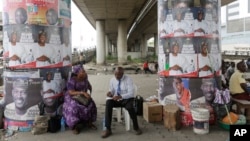Nigeria is Africa’s largest producer of oil. In the heartland of the country’s oil production is Rivers State. On Saturday, voters will choose a new state governor in a closely watched election that will largely be about who gets to control the state’s oil wealth.
Oil brings in 70 percent of the government revenue in Nigeria, and underlies many of the private fortunes in Africa’s largest economy. Rivers State and its capital Port Harcourt are at the heart of petroleum production.
Two men are vying to lead the state in Saturday’s election: Dakuku Peterside of the All Progressives Congress, or APC, and Nyesom Wike of the Peoples Democratic Party, or PDP.
Social justice activist Lucky Onyeka said the state and its oil wealth is crucial for both parties.
“Everybody have a stake in Rivers State because of the oil-rich state," said Onyeka. "No government wants to lose that particular state, because of what is coming up from the state.”
The outgoing Rivers State governor Rotimi Amaechi led the APC’s presidential campaign, which succeeded in getting General Muhammadu Buhari elected in last month’s vote over the PDP’s incumbent president Goodluck Jonathan.
Onyeka said having an APC governor in Rivers is part of the APC’s overall strategy for governing the country now that it has the presidency.
“Now this is where the oil is," said Onyeka. "If they didn’t get some people, anybody from this particular end, it would be difficult for development to even see through normally. But, you know, this time, we want meaningful development.”
Anyakwee Nsirimovu, executive director of the Institute of Human Rights and Humanitarian Law in Port Harcourt, said many supporters of Wike want to keep the state under PDP control for ethnic reasons.
“The president of the federal republic [Jonathon] is from this area. And ethnic politics, for some people, demand that this place remain loyal to him,” he said.
Whoever governs the state will play a crucial role in curbing militancy in the oil-producing region. Militants used to regularly bomb pipelines and kidnap oil workers across the Niger Delta, including in Rivers State, until a 2009 amnesty that gave them money and training in exchange for peace.
Some former militants have said they will resume their fight now that Buhari is in power. Nsirimovu said it will be up to the new governor to deal with them.
“A good, listening, responsive governor in Niger Delta should be able to represent, effectively, the interests of the people of the Niger Delta, remove the politics and deal with the human security issues,” he said.
Whoever wins will have to enforce their mandate with less money than previous governors. Oil is trading around $50 per barrel, making it lean times for all who depend on it for their livelihood.
Hilary Uguru contributed to this report from Port Harcourt, Nigeria.




